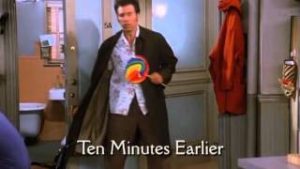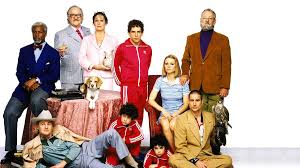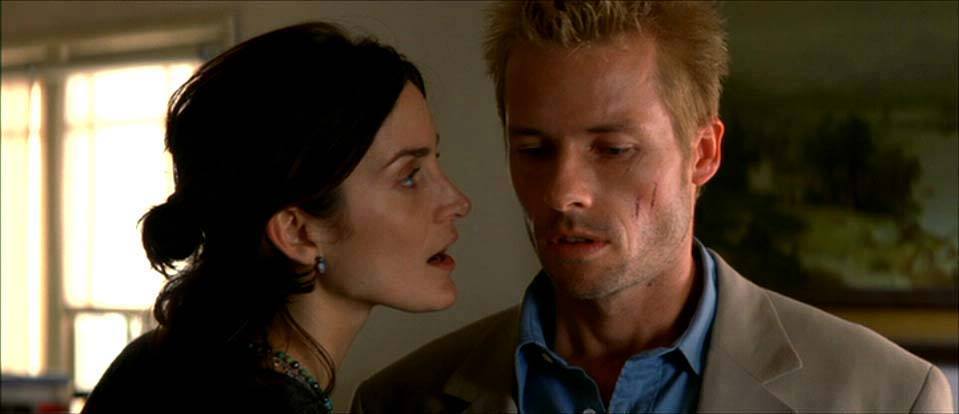Now we get to Nolan’s breakout movie. Memento was the hippest movie of the early 2000s. It’s still #55 on the IMDB Top 250. In preparation for this project, I rewatched it for the first time since college.
Wow, this took me back as much as hearing a remix of Dido’s Thank You on the radio recently did.

Girl you’re my angel, you’re my darling…angel, closer than my peeps you are to me, baby
How does the film hold up? Fantastically!
Following showed how Nolan could make a good movie on what may as well have been a budget of zero. Memento showed how he could make an absolute classic with just $9 million!
It’s certainly high-concept: a man who lost his ability to make new memories after the violent assault that left his wife dead seeks to find the killer. At the time the movie came out most people had never even heard of anterograde amnesia so major props to Jonathan Nolan for writing the unpublished short story this was based on and his big brother Christopher for adapting it so wonderfully.*
The movie gained a lot of attention for telling its story backwards, a narrative device that audiences had ever only been exposed to because of a Seinfeld episode a couple of years earlier.

It’s not just a gimmick though; the fact that we consistently do not know what happened right before the situation we’re in puts us in the same situation as the main character, Leonard. That’s brilliant!
Not all the scenes take place in reverse order though. There are mostly color scenes that do that, but also black and white scenes that move forward. Those show Leonard in his motel room talking to someone on the phone and help ground us a little. Eventually the two parts of the narrative merge.
The movie isn’t simply ingenious in its technique though; it’s also riveting. Guy Pearce is incredible as a man very angry at his lot in life. Not just his wife’s murder, but also (maybe even more so) his own injury leaving him unable to live a normal existence. He will stop at nothing for…vengeance? Or just to give his life some sort of meaning? What’s more important to him?**
There are only three major actors in the low-budget film but the other two are equally impressive. Joe Pantoliano, best known as Ralphie on The Sopranos, is JUST weaselly enough as the cop who is either Leonard’s worst enemy or his biggest ally. Both maybe? Carrie-Anne Moss, best known as Trinity in The Matrix, is the other member of, well, this movie’s trinity, and is pitch-perfect as a woman who alternates between icy and sweet – because when you’re dealing with a guy who has no short-term memory you don’t have to worry about repercussions for either!

***SPOILERS***
The movie’s ending is often debated. Was Teddy telling the truth or blowing smoke up Leonard’s ass to save his own? Obviously he didn’t succeed if it was the latter, but was he telling the truth? It’s clear to me that Leonard did kill the guy who assaulted him (which is how Teddy got the picture of the smiling, shirtless, bloody Leonard) and since then he’s been killing other criminals to whom Teddy has led him because Leonard needs a purpose in life and Teddy would like the cash those criminals have. Did Leonard inadvertently kill his wife though, or was that actually Sammy Jankis?
There is a subliminal frame during the shot of Sammy in the mental hospital, showing Leonard there in his place. I’ve seen the argument, from people who want to believe that Teddy is lying, that that’s simply to throw people off. I feel that’s mental gymnastics though. I have a hard time believing Nolan went through the trouble of inserting something as an Easter egg people must discover on their own only to say it doesn’t mean anything. Occam’s Razor says that secret frame shows the truth.
Granted, Leonard did insist that his wife wasn’t diabetic, but Teddy basically replied with, “Whatever you’ve convinced yourself of.” We’d previously learned in the movie that someone with anterograde amnesia can learn things through repetition if the problem is physical, not mental. We saw Leonard bleeding out from his head wound, and thus his injury was clearly physical. He likely convinced himself that he didn’t accidentally kill his wife as a result of his condition, but rather the thief who caused the head injury also personally murdered Leonard’s wife. Believing that gave Leonard more motivation to seek vengeance, and thus made his days worth struggling through.
Also, why would Teddy lie about any of that? Of course he’s not the most commendable cop, but he ADMITTED he was using Leonard to line his own pockets. He did also claim that he was helping Leonard by giving him the only goal that would make him feel alive, but there was truth to that. If Teddy lied by saying the Sammy story was what really happened to Leonard, what could he have gained at all? I’m not buying it. Again, Occam’s Razor comes into play and it says Teddy got caught in the deception he was pulling on Leonard and decided to get himself out of trouble by being 100% transparent. Of course, Leonard isn’t happy finding out his reason for living was a con. He decides to kill Teddy.
Assuming everything I’m saying is correct, we still have unanswered questions. Who was the insurance claims investigator who told Leonard’s wife the problem was mental, not physical? It obviously couldn’t have been Leonard himself if he was the person being investigated. Did that person really think the problem wasn’t physical, despite the gory head wound Leonard suffered? If Leonard doesn’t want to accept blame for his wife’s accidental death, why would he still make himself feel guilty by convincing himself he caused Sammy’s wife’s accidental death? Of course that’s less of a big deal to him, but why would he make himself feel guilty at all if he’s creating a memory voluntarily? If he did kill his wife due to the short-term memory loss, how did he find out that happened? If Leonard wound up in a mental hospital how did he get out?
That’s kind of the point though. However you want to interpret the movie’s ending we won’t know everything. We’ve spent the whole movie as confused as Leonard, and, tragically, he won’t ever know everything either. In fact, he may have just dug his own grave by making it so one needs to be dug for Teddy. He’s now without the one person who played a big part in his life and kept finding him targets so he could feel like he was avenging his wife. With Teddy gone there will be no more “John G”s. It’s possible Leonard will, this time, make note of having killed John G. and feel like he’s gotten closure. But then he’ll be right back to where he was after killing the real culprit – just feeling empty because his condition leaves him unable to do anything else. If he DOESN’T make note of killing John Edward Gammel, that becomes even more disturbing. He’ll spend the rest of his existence pursuing a nonexistent person and not even getting any leads. It’s heartbreaking to think of such a sick man who’s already lost everything going through that unspeakable mental torture.
Writing this now I’m starting to wonder if Leonard had any family or friends. Why is nobody but freaking Teddy (and Natalie temporarily) keeping him company or talking to him? He needs friends and family as much as anyone has ever needed them.
Maybe he somehow never had them though. Maybe his wife really was his whole world. If so no wonder he lost his mind after she died, especially if he was to blame. You can certainly understand his concocting a different story and teaching it to himself with repetition.
***SPOILERS***

The more you think about it the darker and more intense this movie becomes. It passes the ultimate test of remaining with you for months and years after you’ve watched it.
Bottom Line: Christopher Nolan had arrived!
Up Next: His first studio movie!
*Trying not to get triggered thinking about how the Nolans (and Wes Anderson and Owen Wilson for The Royal Tenenbaums) lost the Best Original Screenplay Oscar to the guy who wrote Gosford Park, trying not to get triggered thinking about how the Nolans (and Wes Anderson and Owen Wilson for The Royal Tenenbaums) lost the Best Original Screenplay Oscar to the guy who wrote Gosford Park, trying not to get trig….

They feel Leonard’s pain.
**It’s too bad that what should have been a life-changing role didn’t make Pearce an A-list star. Then again, if audiences weren’t gonna watch his big-budget starring roles in The Count of Monte Cristo or The Time Machine what can you do?
%

Recent Comments